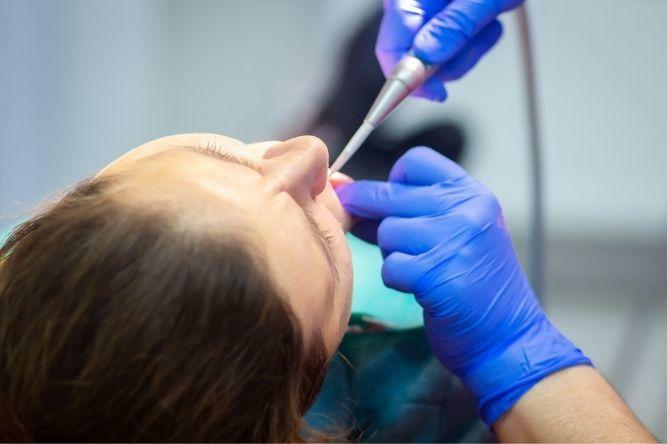Does this sound like you? It’s time to book your next dental cleaning, but as usual, you keep putting it off.
That is a telltale sign of dental anxiety. You may experience other common symptoms, like:
- The thought of going to the dentist’s office makes your palms sweat.
- You have a hard time relaxing during your dental treatments (possibly due to fear of pain or a strong gag reflex).
- Even though you need to see a dentist, the thought of making an appointment stresses you out.
If you answered “Yes” to any of the above, you might be dealing with dental anxiety. This common condition not only causes stress, but it interferes with your dental health. If your fear prevents you from getting the dental procedures you need, you could end up developing a cavity, root canal infection, or gum disease.
But if you don’t know much about sedation dentistry, the thought of it might make you nervous, too. How effective are these treatments? Will they cause side effects? And are they safe for patients of all ages?
We’re here to clear the air about nitrous oxide sedation (or laughing gas), oral sedation, and IV sedation. In this article, we’re going to answer the most common questions about sedation treatments in dentistry:
What are the differences between the various types of sedation?
First, let’s talk about the various kinds of sedatives. There are three main types of general anaesthesia used in dentistry:
- Nitrous oxide. This medication is administered through a small mask, which is put over the patient’s mouth and nose. The gas itself is odourless and colourless. With this sedation method, patients will feel relaxed, but they will not fall entirely asleep. Since it may cause feelings of happiness and euphoria, it’s often referred to as “laughing gas”.
- Oral conscious sedation. Patients take this pill about one hour before their appointment. Once the medication takes effect, the patient will notice feelings of drowsiness and relaxation. Even though the patient will feel quite out of it, they won’t be entirely asleep; that’s why the medication is called oral conscious sedation. You may feel groggy for several hours after your dental procedure–we strongly recommend that you arrange for someone else to drive you home.
- IV sedation. As the name implies, intravenous sedation is administered through the bloodstream using a thin needle. It puts the patient into a deep sleep (or a semi-awake state, where the patient is unaware of their surroundings). Many patients have little to no memory of the procedure afterwards. Of these three sedation methods, IV sedation provides the deepest level of sleep.
At Affinity Dental, we offer all kinds of dental sedation solutions. One of our dentists can meet with you to determine which method is right for you.
Make your next dental visit a stress-free experience with our sedation dentistry in Winnipeg. If you have additional questions about types of sedation, contact us today!
How can sleep dentistry help me?
Stress is our body’s natural response to threatening or high-pressure situations. In some ways, stress can be useful. For example, if you’re stressed about an upcoming performance review at your job, it can motivate you to work harder. In turn, that hard work can lead to a promotion.
But what happens when that stress isn’t helpful? With dental anxiety, your fear might hold you back from getting the dental treatment you need. The only outcome is that you feel uncomfortable, and your oral health becomes worse.
Before your next oral surgery or regular cleaning, consider asking your dentist if sedation dentistry is right for you.
Is sedation dentistry safe?
When you receive dental sedation at our practice, you can trust that you’re in good hands. Our dentists have years of experience with administering nitrous oxide, oral sedation, and IV sedation. Throughout your procedure, we will closely monitor your symptoms in case of any adverse reactions. We have the experience, training, and qualifications to administer various kinds of general anaesthesia.
Our sedation dentistry solutions can be used with family members of all ages. Did you know that dental sedation can even be used with children? Nitrous oxide is a safe and effective solution for children’s dental anxiety.
What are the effects of dental sedation, and how long will they last?
With most sedation options, you’ll notice the following sensations:
- Less dental anxiety and discomfort
- It’s easier to remain calm
- A loss of awareness or consciousness
The duration of these effects will vary based on the dosage and type of dental sedation that you choose. In general, the effects of nitrous oxide wear off the quickest, while those of oral sedation and IV sedation can linger for a few hours after the treatment.
Am I a good candidate for sedation dentistry?
Most patients feel a bit of unease before their dental appointment. But is sedation dentistry the solution? To help you answer that, try asking yourself the following questions:
- Does my sensitive gag reflex get in the way of my treatment?
- Will I have an easier time at the dental office with a sedative?
- If I try sedation dentistry, could it improve my overall oral health and help me schedule dental treatments?
These are all great reasons to consider a sedation option. If you think you can benefit from dental sedation, consider asking your dentist about it during your next visit.
If you still have questions about sedation dentistry, we’re here to help. At Affinity Dental, we’ll connect you with an experienced dentist in Winnipeg who can answer any questions you may have about your treatment. To book your appointment, contact our dental team today!
